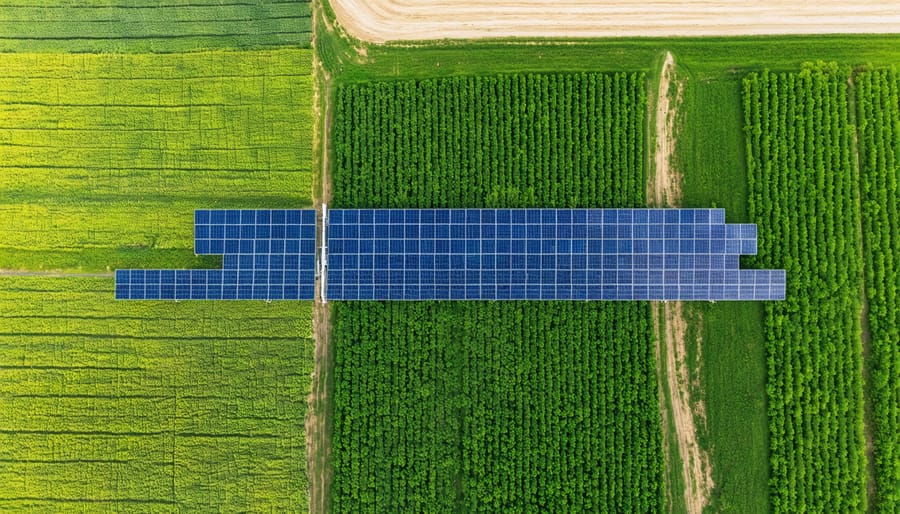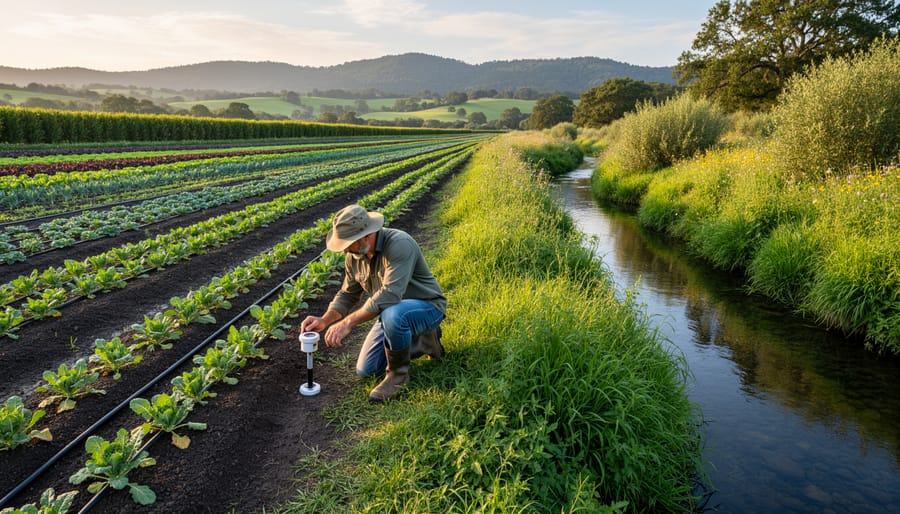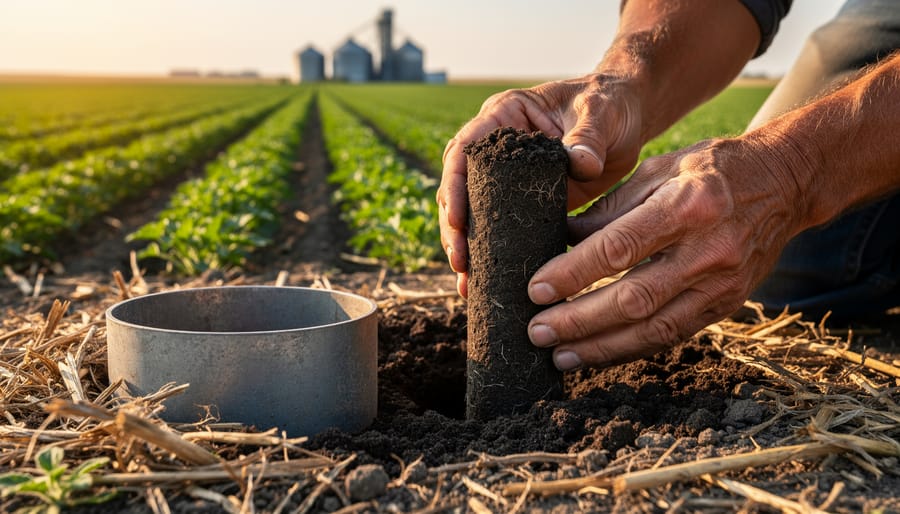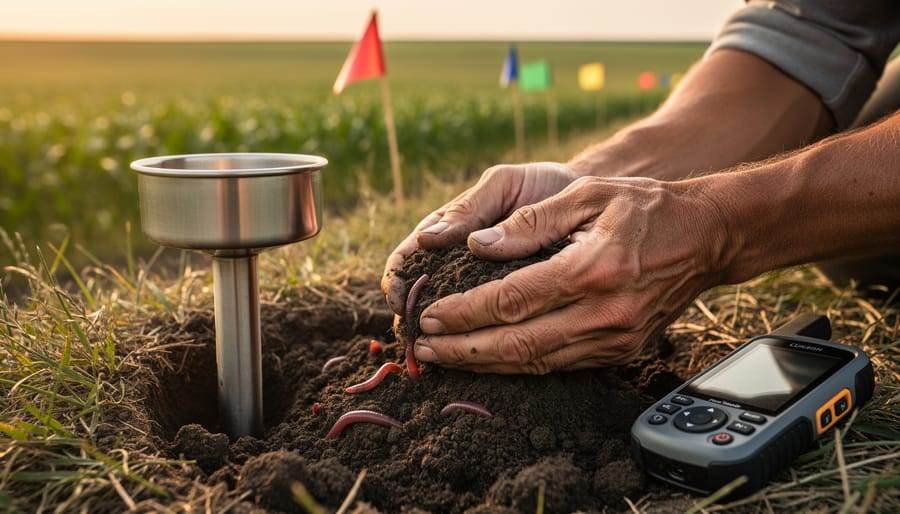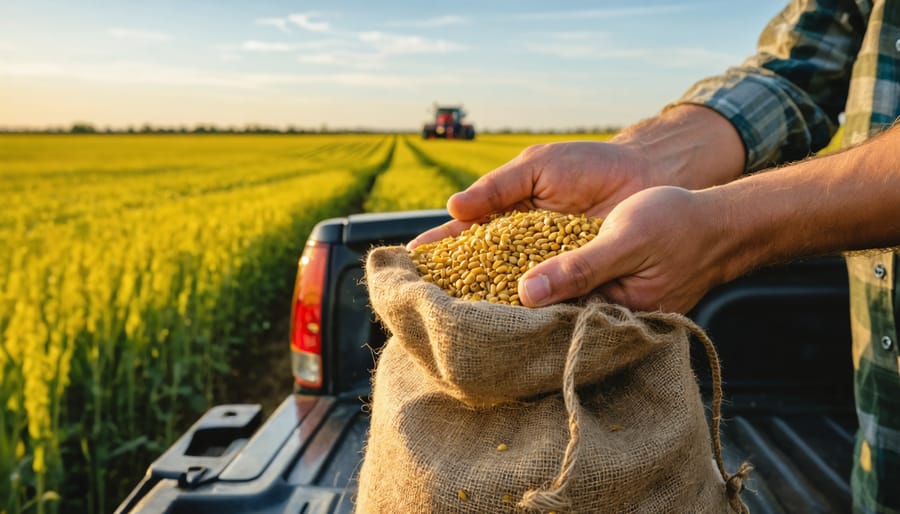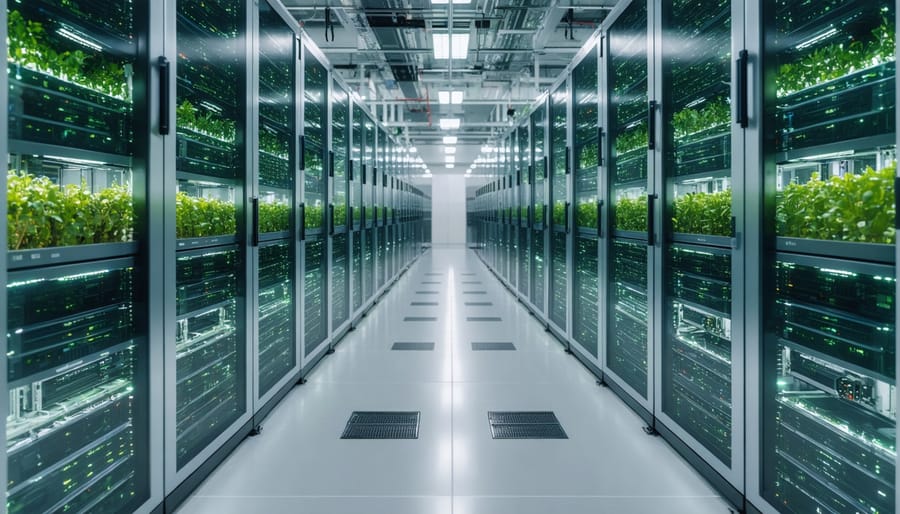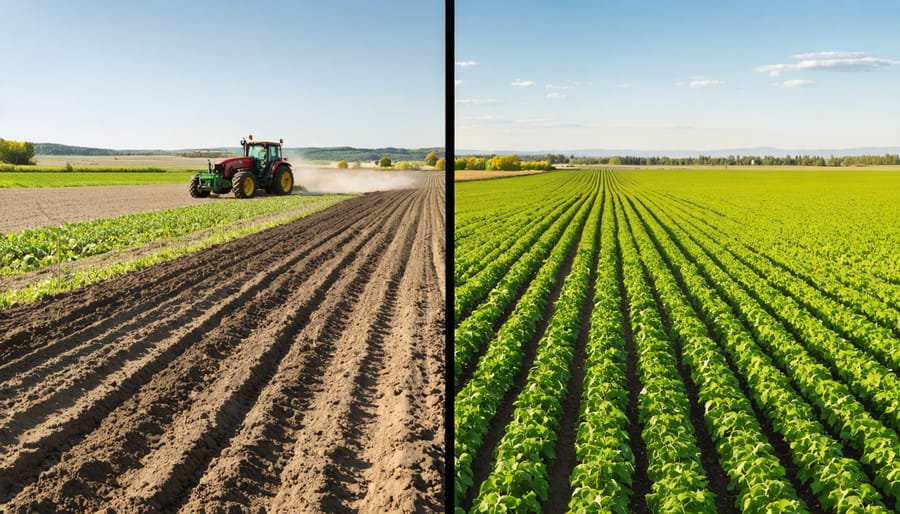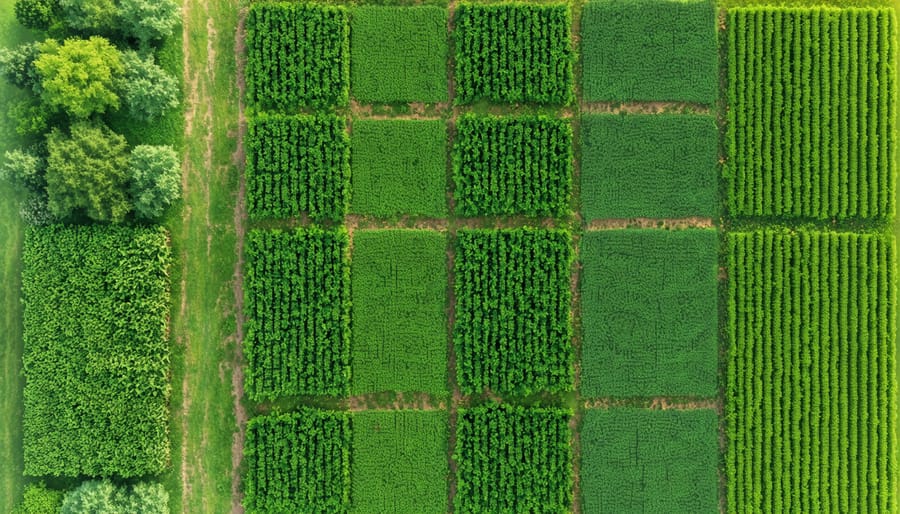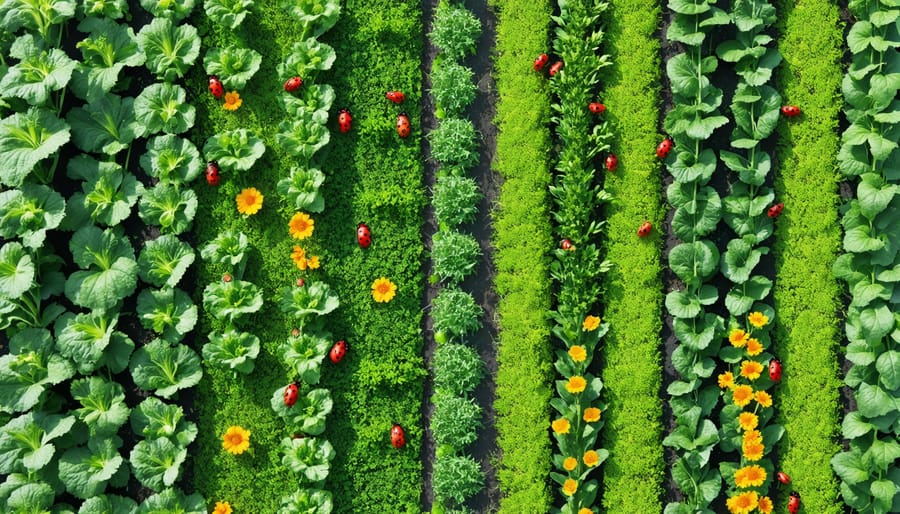Transforming Alberta’s agricultural landscape demands a bold shift toward sustainable farming practices backed by robust policy frameworks. Canadian farmers now stand at a crucial intersection where environmental stewardship meets economic viability, supported by groundbreaking provincial initiatives that offer up to $500,000 in matching grants for sustainability projects. These policies, shaped by decades of agricultural innovation and climate research, have already helped over 2,000 Alberta farmers reduce water consumption by 30% while increasing crop yields by 25% through precision agriculture techniques. By integrating traditional farming wisdom with cutting-edge technology and policy support, Alberta’s agricultural sector is pioneering a model that balances productivity with environmental responsibility. This transformation isn’t just about regulatory compliance – it’s about securing the future of Canadian agriculture while protecting our soil, water, and air for generations to come. Our farmers are leading this change, demonstrating that sustainable agriculture isn’t just an environmental imperative but a powerful economic opportunity.
Current State of Alberta’s Agricultural Policies
Environmental Farm Plans
Environmental Farm Plans (EFPs) have become a cornerstone of sustainable agriculture in Alberta, helping producers address current farming challenges while protecting natural resources. These voluntary, confidential assessments enable farmers to evaluate their operations’ environmental risks and develop practical solutions.
Through the Agricultural Service Board, Alberta provides free technical support and guidance for completing EFPs. The process typically involves a comprehensive review of soil health, water management, wildlife habitat, and energy efficiency. Farmers who complete an EFP often become eligible for various cost-share funding programs and grants.
The Alberta Environmental Farm Plan Association reports that over 8,000 producers have completed EFPs, leading to significant improvements in watershed protection and soil conservation. Many participants have implemented changes like buffer zones along waterways, improved manure management systems, and enhanced pest control strategies.
To get started, farmers can connect with local EFP technicians who provide one-on-one assistance throughout the planning process. Regular updates and renewals every five years ensure plans remain relevant and effective, adapting to changing environmental conditions and farm operations.
Carbon Offset Programs
Alberta farmers have access to several valuable carbon offset programs that reward sustainable agricultural practices while contributing to climate change mitigation. Through the Alberta Emission Offset System, farmers can earn carbon credits for activities like reduced tillage, improved nitrogen management, and continuous cropping practices.
The Conservation Cropping Protocol is particularly popular among Alberta producers, offering credits for practices that enhance soil carbon storage. Farmers typically earn between $1.50 and $15 per acre annually, depending on their specific practices and market conditions. These credits can be sold to industrial emitters through approved carbon offset registries.
The program also recognizes innovative practices such as precision agriculture and enhanced efficiency fertilizers. To participate, farmers must maintain detailed records of their practices and work with approved verification bodies to quantify their carbon reductions.
Local agricultural societies and extension services offer support in navigating the application process and connecting with aggregators who can help bundle credits from multiple farms. Success stories from participating farmers show that these programs not only provide additional revenue streams but also improve soil health and farm resilience.
Practical Policy Solutions That Work
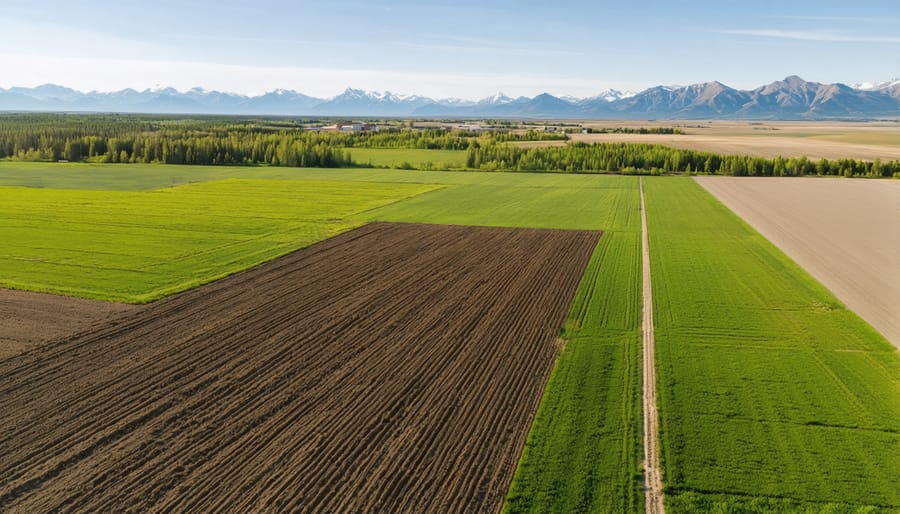
Soil Health Initiatives
Alberta’s soil health initiatives represent a cornerstone of sustainable farming practices, offering farmers comprehensive support for maintaining and improving their soil quality. The Environmental Farm Plan (EFP) program provides funding of up to $50,000 per farm for implementing soil conservation practices, including reduced tillage systems and cover crop establishment.
The Canadian Agricultural Partnership’s Soil Health Program offers cost-sharing opportunities for farmers implementing practices that enhance soil organic matter and reduce erosion. These initiatives align with regenerative agriculture benefits and have shown remarkable success across the province.
Notable programs include the Living Labs Initiative, where Alberta farmers collaborate with scientists to test innovative soil management techniques under real farming conditions. The program has helped over 200 farms implement sustainable practices while measuring improvements in soil organic carbon and water retention.
Local soil testing services are subsidized through regional agricultural offices, allowing farmers to monitor their soil health progress accurately. The Alberta Soil Information Viewer provides detailed soil mapping and analysis tools, helping farmers make informed decisions about land management.
Financial support is available through the Agricultural Financial Services Corporation (AFSC), offering low-interest loans specifically for soil improvement projects. Farmers can access up to $100,000 in funding for implementing approved soil conservation practices, with flexible repayment terms based on farm income.
Water Management Support
In Alberta’s diverse agricultural landscape, effective water management remains crucial for sustainable farming. The province’s Water for Life strategy provides comprehensive support for irrigation efficiency improvements, offering cost-sharing programs that can cover up to 50% of irrigation system upgrades. Farmers can access funding for precision irrigation technologies, including soil moisture sensors and weather monitoring systems.
The Canadian Agricultural Partnership (CAP) further strengthens water conservation efforts by providing grants for water-saving initiatives. Notable success stories include the Taber Irrigation District, where modern pivot irrigation systems have reduced water usage by 30% while maintaining crop yields. These systems allow for precise water application based on real-time soil moisture data and weather conditions.
Water stewardship programs encourage farmers to implement beneficial management practices such as conservation tillage and riparian area protection. The Environmental Farm Plan program offers guidance on developing comprehensive water management strategies tailored to individual farm operations. Participants can receive technical support for conducting water audits and implementing water-efficient solutions.
Looking ahead, Alberta’s irrigation districts are investing in infrastructure modernization, including canal lining and automated control systems. These improvements help minimize water losses and ensure more reliable delivery to farms. Producers can also access expert consultation through local agricultural fieldmen and irrigation specialists who provide personalized recommendations for optimizing water use efficiency.
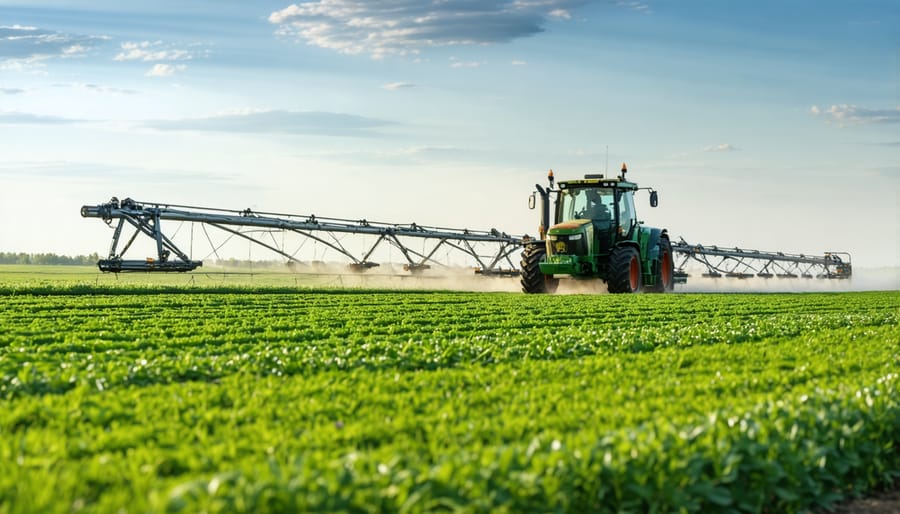
Clean Technology Adoption
Alberta’s agricultural sector is experiencing a significant shift toward clean technology adoption, supported by various government initiatives and funding programs. The Canadian Agricultural Clean Technology Program (ACT) offers grants covering up to 50% of project costs for innovations that reduce emissions and enhance sustainability on farms.
Farmers can access funding for technologies like solar panels, energy-efficient grain dryers, and precision agriculture equipment. For example, the Morrison Farm near Lacombe successfully implemented GPS-guided tractors and variable-rate fertilizer applications, reducing their input costs by 15% while maintaining yield levels.
The Agricultural Clean Technology Program prioritizes projects that demonstrate measurable environmental benefits. Current funding streams support purchases of equipment for precision agriculture, renewable energy systems, and energy-efficient upgrades. Typical grant amounts range from $50,000 to $2 million for individual farm projects.
To access these supports, farmers can apply through their local agricultural service board or directly through Agriculture and Agri-Food Canada. The application process requires a project proposal outlining expected environmental benefits and implementation timeline. Free assistance with applications is available through regional agricultural offices.
Additional support comes from the Environmental Stewardship and Climate Change Producer Program, which offers cost-sharing opportunities for smaller-scale technology adoptions. Local success stories include several Lethbridge-area farms that have reduced water consumption by 30% through smart irrigation systems funded through these programs.
Success Stories from Alberta’s Fields
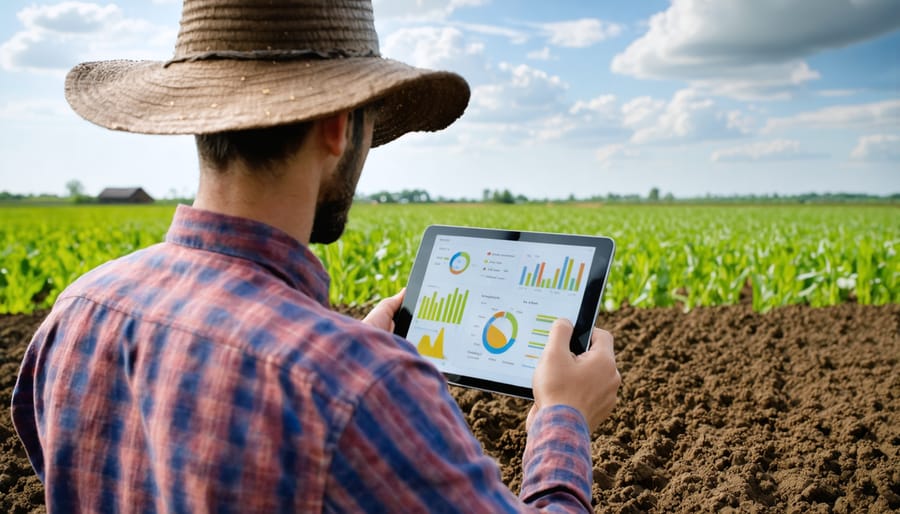
Southern Alberta Case Study
Located just outside of Lethbridge, the Wilson Family Farm stands as a compelling example of how agricultural policy support can drive sustainable transformation. In 2018, Sarah and James Wilson made the bold decision to transition their 800-hectare conventional grain operation into a regenerative farming system, utilizing funding from Alberta’s Environmental Stewardship and Climate Change Producer program.
The Wilsons implemented cover cropping and reduced tillage practices, which initially seemed risky in Southern Alberta’s semi-arid climate. However, with technical support from local agricultural extension officers and a $50,000 government grant, they were able to purchase specialized equipment and conduct soil testing to optimize their approach.
Three years into their transformation, the Wilsons have reported a 40% reduction in synthetic fertilizer use, while maintaining comparable yields. Their soil organic matter has increased from 2.3% to 3.1%, and they’ve documented increased wildlife presence, particularly beneficial insects and native bird species.
“The policy support wasn’t just financial,” explains Sarah Wilson. “The knowledge sharing networks and mentorship programs connected us with other farmers who had already made similar transitions. This practical guidance was invaluable.”
The farm now serves as a demonstration site for sustainable agriculture practices, hosting regular field days where other farmers can learn about policy programs and see firsthand how sustainable practices can work in the Southern Alberta context.
Central Region Innovation
In central Alberta, the County of Red Deer has emerged as a pioneer in sustainable agriculture policy implementation, demonstrating remarkable success through its Regenerative Agriculture Initiative launched in 2019. Local farmer Sarah Thompson’s 400-hectare mixed farm serves as a prime example of policy effectiveness in action.
Thompson participated in the county’s cost-sharing program, which covered 50% of her soil health improvement projects. By implementing cover cropping and rotational grazing practices, she reduced her annual water usage by 30% and increased soil organic matter by 2% over three years. These improvements resulted in a 25% reduction in input costs while maintaining crop yields.
The program’s success stems from its collaborative approach, bringing together local agricultural societies, research institutions, and farming communities. Monthly workshops hosted by the County Agricultural Services Board provide hands-on training in sustainable practices, while a mentor network connects experienced sustainable farmers with those beginning their transition.
What sets this initiative apart is its flexible implementation timeline, allowing farmers to adopt changes at their own pace while maintaining access to support resources. The program has attracted over 200 participating farms in the central region, collectively managing more than 80,000 hectares under sustainable practices.
The initiative’s data-driven approach, combining traditional farming knowledge with modern sustainability metrics, has created a replicable model for other Alberta regions. Regular soil health assessments and biodiversity monitoring provide concrete evidence of environmental improvements while maintaining farm profitability.
Your Next Steps
Available Resources
Alberta farmers can access numerous sustainable agriculture programs through federal and provincial channels. The Canadian Agricultural Partnership (CAP) offers funding opportunities through the Environmental Sustainability and Climate Change programs, with grants up to $100,000 for qualifying projects.
The Environmental Farm Plan (EFP) program provides free technical support and guidance for implementing sustainable practices. Complete your EFP online or attend local workshops to access funding and connect with program advisors.
Alberta’s Agricultural Service Boards offer soil conservation and water management resources, including cost-share programs for equipment upgrades. Visit your local ASB office or access services through the online portal.
For organic transitions, review the certification guidelines and connect with certification bodies like Pro-Cert or OCIA. These organizations provide guidance throughout the certification process.
The Agriculture Financial Services Corporation (AFSC) offers specialized loans and insurance products for sustainable agriculture initiatives. Contact their regional offices or visit afsc.ca to explore financial support options.
Resource booking and application deadlines vary by program. Contact your regional agriculture office for personalized assistance and current program availability.
Application Tips
When applying for sustainable agriculture support programs, timing is crucial. Submit your applications during the winter months when you have more time to gather required documentation. Keep detailed records of your current practices and environmental impacts, as these will strengthen your application.
Start by scheduling a consultation with your local Agricultural Services Board representative. They can review your proposal before submission and offer valuable feedback. Many successful applicants recommend creating a clear implementation timeline and budget breakdown – programs often prioritize well-organized, realistic proposals.
Remember to highlight how your project will benefit both your operation and the broader community. Include specific metrics where possible, such as estimated water conservation amounts or projected soil health improvements. Photos and soil test results from your land can provide powerful supporting evidence.
Don’t hesitate to reach out to farmers who have successfully accessed these programs. The Alberta farming community is known for its collaborative spirit, and many experienced producers are willing to share insights from their application process.
If your first application isn’t successful, request feedback and reapply in the next cycle. Many farmers succeed on their second attempt after refining their proposals.
Sustainable agriculture policies in Alberta represent more than just regulations – they’re our shared commitment to preserving our land for future generations while maintaining profitable farming operations today. Through the programs and initiatives we’ve explored, it’s clear that our agricultural community has the tools and support needed to make meaningful changes.
From carbon offset programs to environmental stewardship grants, Alberta farmers have multiple pathways to integrate sustainable practices while maintaining their bottom line. The success stories we’ve shared from local farms demonstrate that these policies aren’t just theoretical – they’re creating real, positive change across our province.
As we move forward, the key to success lies in our collective action. Whether you’re managing a large-scale operation or a small family farm, every step toward sustainability counts. Consider starting with one or two practices that align with your farm’s needs and capabilities. Reach out to your local agricultural extension office, connect with fellow farmers who have implemented these practices, and take advantage of the available funding and support programs.
Remember, sustainable agriculture isn’t just about environmental protection – it’s about building resilient farming operations that can thrive for generations to come. By working together and leveraging the policies and programs available to us, we can create a stronger, more sustainable agricultural sector in Alberta. The time to act is now, and the resources are at your fingertips.

